Menu

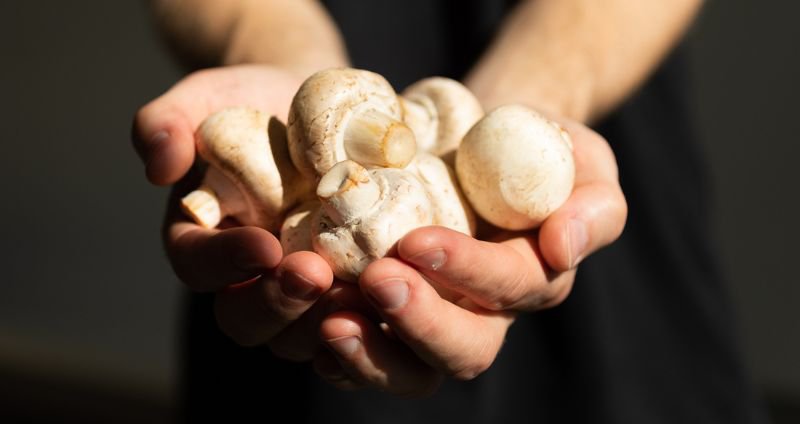

Many mushroom varieties, such as the common white button, cremini, and portobello mushroom, are safe to eat raw, but many others are toxic or hard to digest without cooking.
Various varieties that should never be eaten raw due to their tough texture and potential gut irritants include morels, chanterelles, porcini, and shiitake mushrooms. For these, cooking helps to neutralize toxins and make digestion easier.
This is basic knowledge for anyone who wants to forage and eat raw mushrooms. If you’re unsure about identifying wild mushrooms, buy culinary mushrooms in the store or use natural supplements and adhere to usage instructions.
At Real Mushrooms, we aim to equip you with the knowledge you need to consume raw edible mushrooms safely. We also supply the purest organic mushrooms to make it easier for mushroom lovers to enjoy the best of these functional mushrooms with none of the risks.
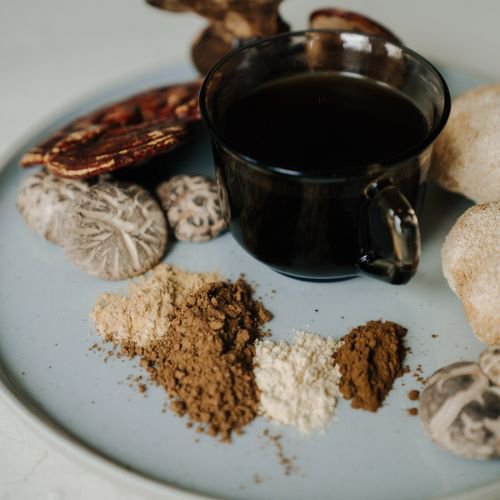
Some edible mushroom varieties can be enjoyed raw, while others require cooking to neutralize potentially harmful compounds and enhance their digestibility and nutritional value.
For instance, cremini and portobello mushrooms are commonly consumed raw in salads or as garnishes. They are generally safe to eat raw, provided they have been properly cleaned and are fresh.
In particular, cremini mushrooms, also known as baby bella mushrooms, are quite versatile and can be eaten both raw and cooked.
When raw, creminis offer a slightly firmer texture and a milder flavor compared to when they are cooked, which deepens their earthy tones and enhances their overall taste. Cooking cremini mushrooms also helps make their nutrients more bioavailable and can be easier on the digestive system for some people.
A slightly different question we’ve heard is, can you eat raw mushrooms in powder form?
Yes, you can consume mushrooms in raw powder form, as these products are typically made from mushrooms that have been dried and ground, and are often intended for use as flavor enhancers.
NOTE: Mushroom powders are not to be confused with mushroom extract powders. The former is useful for culinary purposes. Meanwhile, the latter is the dry, concentrated extraction from a functional mushroom for health purposes.
Eating raw mushrooms found in the wild is highly risky due to the potential presence of toxins or poisonous compounds. Many wild mushrooms are difficult to identify accurately and can be mistaken for toxic or poisonous varieties.
Consuming raw wild mushrooms increases the risk of severe poisoning, allergic reactions, and other health issues. While some mushroom identification apps are available, It's essential to have expert knowledge or consult with a mycologist before consuming any mushrooms gathered from the wild.
Even edible species should be cooked to eliminate possible toxins and make them safer and easier to digest. Always prioritize safety and certainty when dealing with wild mushrooms.
Action: Never eat raw mushrooms, whether wild or domestic, even if you think they’re safe. Always cook mushrooms before eating them. Also, some mushrooms may need to be peeled before cooking.
Some types of mushrooms can be hard to digest when eaten raw. This is because they contain tough cell walls that can be difficult for the body to break down, potentially leading to digestive discomfort.
Cooking mushrooms helps to break down these cell walls, making them easier to digest and allowing the body to absorb their nutrients more effectively.
Examples include shiitake, whose tough texture softens with heat, porcini mushrooms, which become more flavorful and less fibrous when cooked, and chanterelles, whose nutrients are more accessible post-cooking.
Certain mushrooms contain small amounts of toxins that can be harmful if consumed in large quantities. Cooking morels and false morels is crucial, not only for digestibility but also to eliminate harmful toxins present in these varieties.
For example, the common white button mushroom contains a compound called agaritine, which has been shown to have carcinogenic properties in animal studies. However, thoroughly cooking white button mushrooms decreases the level of agaritine.
Lastly, as with other fresh produce, mushrooms can carry harmful bacteria if not properly handled and stored.
At Real Mushrooms, we take great care to ensure the safety and quality of our products. Our mushrooms are grown in controlled environments to minimize contamination risk, and they are thoroughly tested for purity and potency.
When it comes to our mushroom supplements, you can trust that you’re getting a safe, high-quality product.
Tip: While the amount of agaritine in a single mushroom is typically very small, it can accumulate in the body if you eat a lot of raw mushrooms over a long period of time. Cooking mushrooms can help to reduce their agaritine content.
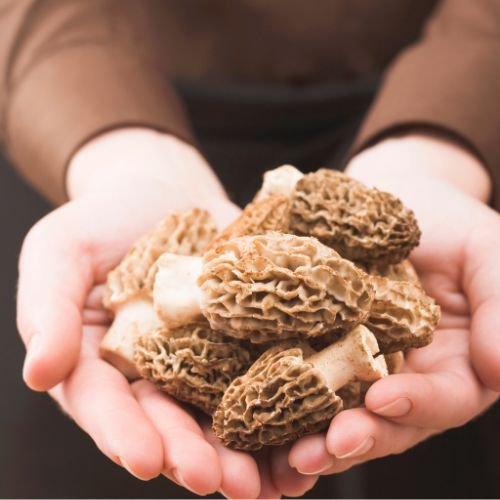
Not all types of edible mushrooms are safe to eat raw. Some contain toxins that can only be broken down by cooking, while others may harbor harmful bacteria and parasites.
Raw consumption of certain mushrooms can lead to digestive discomfort, allergic reactions, or more severe health issues.
Some mushroom varieties, like morels and shiitake, should always be cooked before consumption. Morels contain a compound called hydrazine, which can cause upset stomach and other symptoms if ingested raw.
Shiitake mushrooms, while highly nutritious with lots of nutritional and medicinal compounds, can cause dermatitis in some people when eaten raw.
Turkey tail mushrooms, a popular variety used in natural health supplements, are not typically consumed in their raw form. Instead, they are often extracted into a powder that can be added to teas, smoothies, or other foods.
Real Mushrooms extracts are one of the safest ways to consume mushrooms. Made from 100% organic mushrooms, we test all mushrooms for quality and to make sure there are no contaminants, including pesticides and heavy metals.
This is one way to get all the medical benefits without any of the potential risks associated with raw mushroom consumption. For instance, try the Turkey Tail Mushroom Extract below for immune support.
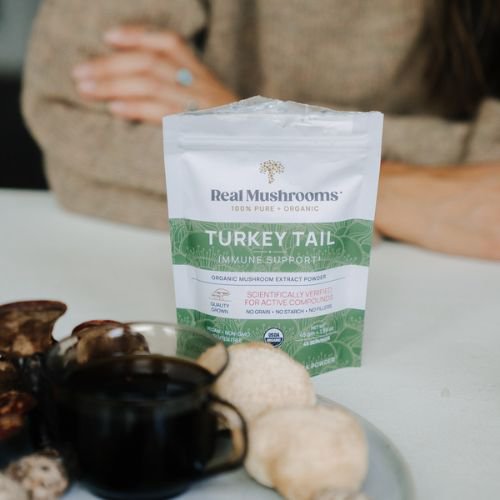
While it’s relatively rare, it’s possible to get food poisoning from eating raw mushrooms. This is usually due to improper handling or storage, which can lead to the growth of harmful bacteria.
Here are some key factors that can increase your risk of catching food poisoning from eating mushrooms.
Some mushroom varieties, like the common button mushroom, are generally safe to eat raw if properly handled and stored.
However, other types, such as morel mushrooms should always be cooked before eating to eliminate potential toxins.
Mushrooms can be a breeding ground for bacteria if not handled correctly. Always wash your hands before handling mushrooms and use clean utensils and surfaces to prepare them.
Also, buy your mushrooms from reputable sellers who have a track record of safety, reliability, and 5-star quality.
Mushrooms should be stored in the refrigerator, ideally in a paper bag to allow them to breathe. They should be used within a week of purchase to ensure freshness.
If you’ve eaten a raw mushroom and start to feel unwell, symptoms of food poisoning can include nausea, vomiting, diarrhea, stomach cramps, and fever.
If you experience these symptoms and believe you may have food poisoning, seek immediate medical attention.
At Real Mushrooms, we’re committed to providing high-quality, safe products. Our mushrooms are carefully grown, harvested, and processed to ensure they’re free from harmful bacteria and toxins.
While we always recommend cooking mushrooms to bring out their best flavor and nutritional benefits, our products are safe to consume raw if you choose to do so. However, as with any raw food, it’s important to handle and store them properly to prevent the risk of food poisoning.
Caution! If you choose to eat wild mushrooms, safety should be your first concern. Some wild mushrooms are deadly, and never eat a mushroom you have not positively identified. Eating poisonous mushrooms could lead to severe health consequences, including liver failure, neurological damage, and potential death.
When consuming any new food, it’s important to be aware of potential adverse reactions. While raw mushrooms are generally safe for most people, some individuals may experience a negative reaction.
Here are some symptoms to watch out for:
The table below from the International Journal of Pharmacy and Therapeutics shows the comparison of some mushroom species’ toxin content, and their corresponding onset of symptoms and area of geographical distribution.
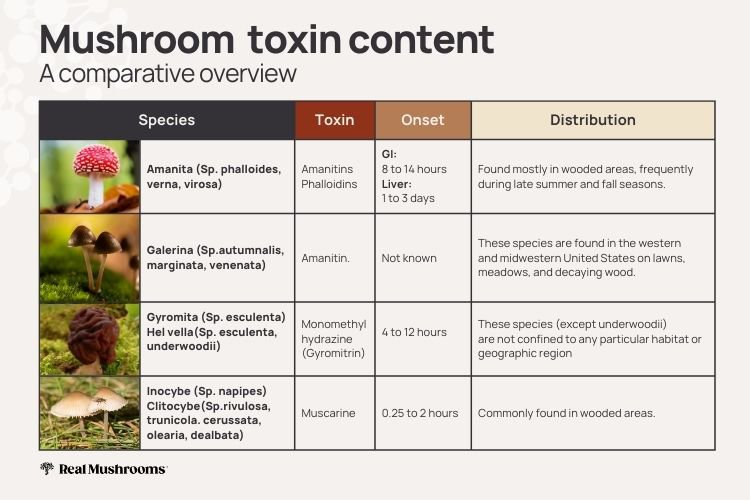
Ensure that your mushrooms are sourced from a reliable supplier, to avoid this risk.
Everyone’s body reacts differently to different foods. If you’re trying raw mushrooms for the first time, start with a small amount to see how your body reacts.
If you experience any adverse symptoms, avoid raw mushrooms or try cooked mushrooms instead. As always, when in doubt, consult with a healthcare professional.
While mushrooms can be a healthy addition to many people’s diets, certain groups should exercise caution when consuming them raw.
Raw mushrooms contain chitin, a type of fiber that is difficult for the human body to digest. This can cause discomfort, bloating, and other digestive issues, particularly in individuals with pre-existing digestive conditions such as Irritable Bowel Syndrome (IBS) or Inflammatory Bowel Disease (IBD).
Raw mushrooms can carry bacteria and other microorganisms that could potentially cause illness.
People with weakened immune systems, such as those undergoing chemotherapy, those with HIV/AIDS, or individuals who have had organ transplants, should avoid eating raw mushrooms to reduce the risk of infection.
While mushrooms can provide beneficial nutrients, the potential presence of bacteria in raw mushrooms could pose a risk to pregnant or breastfeeding women. Cooking mushrooms thoroughly can help to eliminate this risk.
Both these groups may have less robust immune systems and could be more susceptible to potential bacteria present in raw mushrooms.
For those who want to enjoy the benefits of mushrooms without the potential risks associated with eating them raw, Real Mushrooms offers a range of high-quality, organically sourced mushroom supplements.
Our mushroom extracts give you all the health benefits of mushrooms without the need for preparation or concerns about potential bacteria.
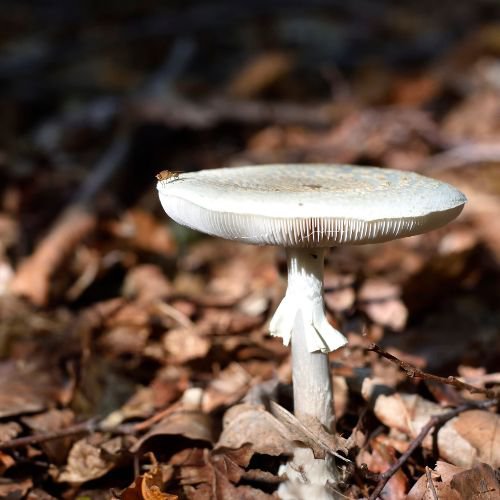
Did You Know? Amanita phalloides, known commonly as the death cap mushroom, is the world’s deadliest mushroom. It contains amatoxins, a group of bicyclic octapeptides that are responsible for 90% of global mushroom-related fatalities.
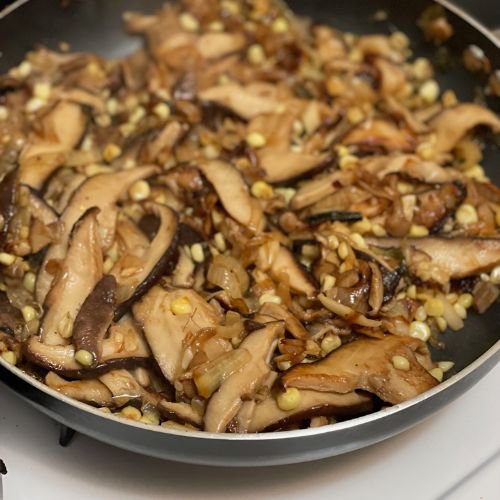
Mushrooms can be a valuable addition to your diet due to their rich nutritional profile.
They are low in calories, yet packed with essential nutrients that contribute to overall health and wellbeing.
Here are some of the key nutritional benefits of eating mushrooms:
Raw mushrooms are a good source of essential vitamins and minerals, including vitamin D, B vitamins, selenium, and potassium. These nutrients are crucial in maintaining bone health, supporting the immune system, and promoting heart health.
Mushrooms are high in antioxidants, substances that help protect the body’s cells against damage from free radicals. This can contribute to reduced inflammation and lower risk of chronic diseases (1).
Raw mushrooms provide a decent amount of dietary fiber, which aids in digestion, helps maintain a healthy weight, and lowers the risk of heart disease and type 2 diabetes.
While not as high as in meat or beans, mushrooms contain protein, with higher levels in dried mushrooms (2). They are a good source of amino acids for building and repairing body tissues. Cooked mushrooms make a great meat substitute because they have a meaty texture and flavor, and contain protein.
Raw mushrooms are low in calories and fat, making them a great choice for those looking to maintain a healthy weight or lose weight (3).
In conclusion, while mushrooms can be a nutritious addition to your diet, not all culinary mushrooms are safe to eat raw, and some may even cause food poisoning or allergic reactions. However, when properly selected, prepared, and stored, culinary mushrooms can offer a range of health benefits.
They are a rich source of essential nutrients and can contribute to a balanced, healthy diet.
For those who would like to reap the immune-modulating and longevity-supporting benefits of mushrooms, but prefer not to eat them, mushroom supplements are a good alternative. As with any natural health supplement, it’s always best to choose products from trusted sources like Real Mushrooms, known for their commitment to quality and safety.
Remember, your health is worth the investment!
Now that you know more about consuming raw mushrooms, we encourage you to explore our wide selection of mushroom supplements. Find the option that best suits your needs and preferences.

 .
.Disclaimer: The information or products mentioned in this article are provided as information resources only, and are not to be used or relied on to diagnose, treat, cure, or prevent any disease. This information does not create any patient-doctor relationship, and should not be used as a substitute for professional diagnosis and treatment. The information is intended for health care professionals only. The statements made in this article have not been evaluated by the Food and Drug Administration. Any products mentioned are not intended to diagnose, treat, cure, or prevent any disease. The information in this article is intended for educational purposes. The information is not intended to replace medical advice offered by licensed medical physicians. Please consult your doctor or health practitioner for any medical advice.